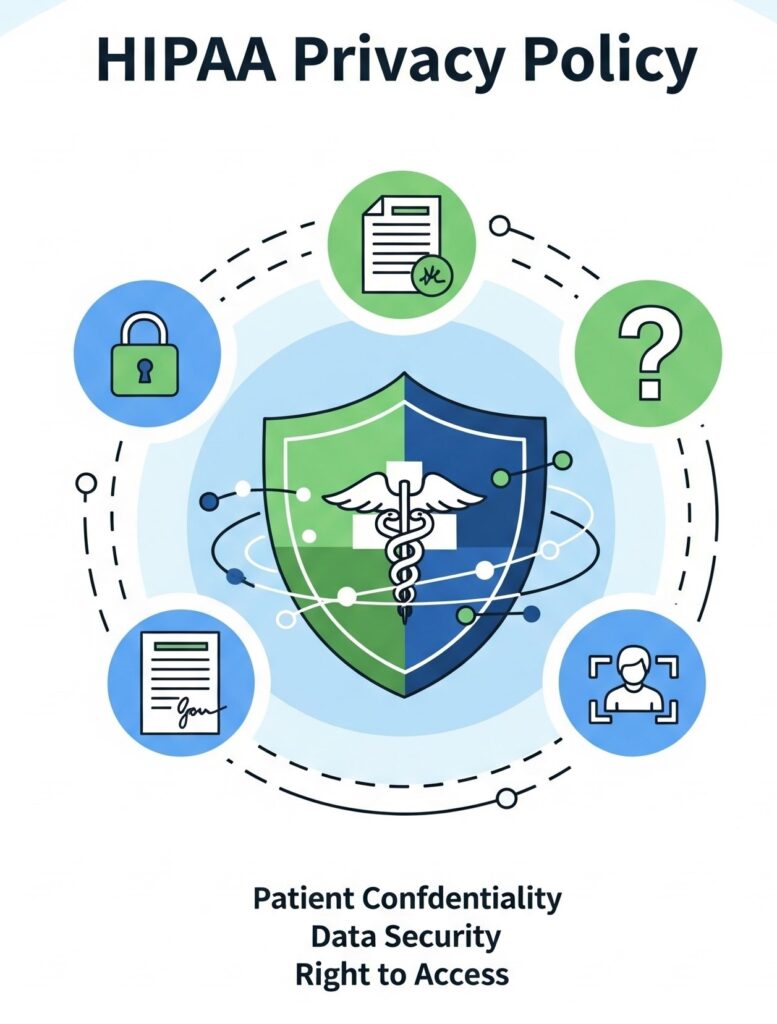The CHPSE Certification: A Must-Have for New HIPAA Privacy Officers
August 7, 2025HIPAA Training Requirements Made Simple: A Complete Guide for Every Organization
August 10, 2025HIPAA Privacy Policies Explained: Everything Healthcare Providers Need to Know
In today’s data-driven world, patients are more concerned than ever about how their personal health information is used and protected. That’s where HIPAA Privacy Policies come into play. These policies serve as the backbone of any healthcare organization’s data protection practices.

In this blog, we’ll answer all your questions: What is a HIPAA Privacy Policy? Who needs one? And what must it include?
📖 What Exactly Is a HIPAA Privacy Policy?
A HIPAA Privacy Policy is a formal, internal document that outlines how an organization collects, uses, stores, shares, and protects Protected Health Information (PHI). It aligns with the standards set by the HIPAA Privacy Rule, which governs all aspects of PHI handling.
This policy acts as your organization’s blueprint for ensuring that patient information remains confidential and is only used or disclosed for approved purposes.
🧱 Core Elements of a HIPAA Privacy Policy
A strong HIPAA Privacy Policy typically addresses:
- The types of PHI your organization collects
- How and why PHI may be used or disclosed
- How patients can access or correct their information
- Procedures for handling unauthorized disclosures
- Employee training and enforcement protocols
- Documentation of all disclosures
👩⚕️ Who Is Required to Have a HIPAA Privacy Policy?
You must have a HIPAA Privacy Policy if you are classified as:
- A Covered Entity (e.g., doctors, clinics, health plans)
- A Business Associate (e.g., third-party billing services, IT vendors)
- A Hybrid Entity (organizations that perform both covered and non-covered functions)
Regardless of your size, if you handle PHI, a privacy policy is a non-negotiable requirement.
📢 Don’t Confuse It with the Notice of Privacy Practices
A Notice of Privacy Practices (NPP) is what patients see. It explains:
- How their PHI may be used
- Their rights under HIPAA
- How to file a complaint
Your HIPAA Privacy Policy, on the other hand, is an internal policy document created to guide your organization’s compliance and data handling practices.
⚖️ What Are the Risks of Non-Compliance?
Not having a proper privacy policy can lead to:
| Risk | Impact |
| 🧾 HIPAA Fines | $100 to $50,000+ per violation |
| 👨⚖️ Legal Action | Lawsuits from patients |
| 🔍 Audits | Scrutiny by the Office for Civil Rights |
| 💔 Reputation Loss | Damage to patient trust and business |
🧰 How to Implement a HIPAA Privacy Policy
- Assign a HIPAA Privacy Officer
- Conduct a Privacy Risk Assessment
- Customize your policy based on how you handle PHI
- Train all employees on the policy
- Review and update your policy regularly
📝 Pro Tip
Always document when and how you train staff on HIPAA privacy rules. In an audit, having a privacy policy is not enough—you must also prove that it is enforced.
🏁 Conclusion
A HIPAA Privacy Policy is a foundational component of data security and regulatory compliance in the healthcare industry. Don’t treat it as a one-time task—make it a living document that reflects your evolving practices, technologies, and legal obligations. Investing time in creating and enforcing a strong privacy policy is an investment in your patients’ trust and your organization’s long-term compliance.
